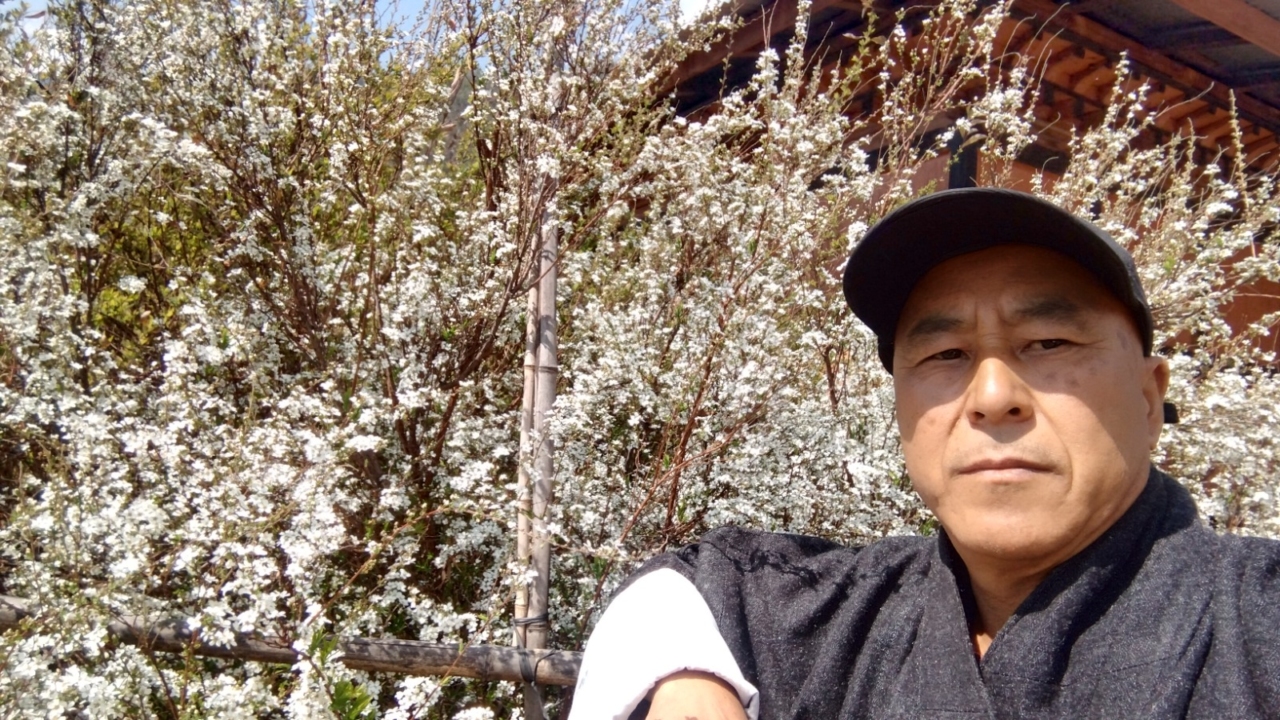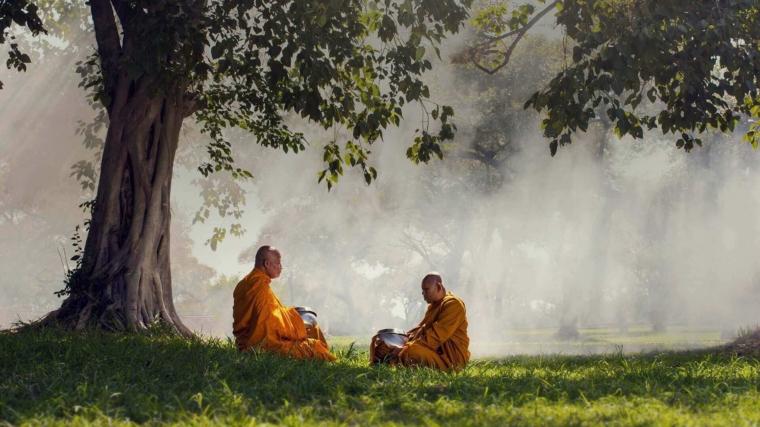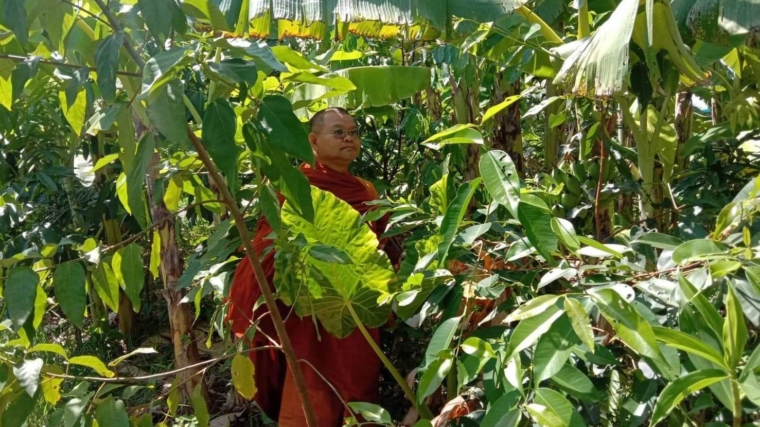Farming with Metta
by Linus Dolfini
Bangkok, May 12, 2025
Over fifteen years ago, the Bhutan Soul Farmers, under the leadership of their founder, Lhundup Dukpa, began their work as organic farmers. They have been developing and implementing ways of organic and sustainable farming, and throughout the years, they have shared their knowledge and visions with the community around them. These days the team is working on a new eco-temple project, that can be separated into two sub-projects: a horticulture and a floriculture. While horticulture describes the art of growing fruits, vegetables, trees, shrubs and ornamental plants, floriculture is about the cultivation of flowers. These two new cultures are located in two different places but are integrated into one single project. Originally, the Soul Farmers focused on growing apples. They were doing it in an organic way; however, the apple plant was a monoculture. Lhundup explains that during the past five years, their apples have not been doing well, so he decided to change the approach altogether.
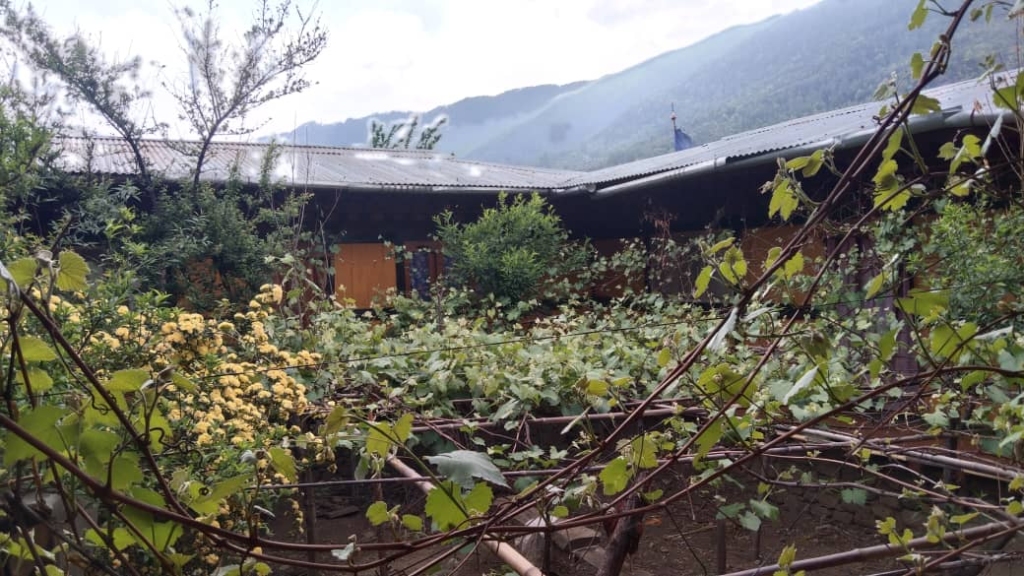
Instead of focusing on monocultures, they are now planting mixed fruit trees and trying to follow the principles of permaculture; utilizing the land and the environment in a way that doesn’t produce waste, while developing an ecosystem that is self-sustainable. In their horticulture they now grow various seasonal plants such as kiwis, grapes, prunes, plums, walnuts, pure apples, pears, almonds, and peaches. In total the culture includes around 200 trees. In the floriculture Lhundup started to grow mixed organic flowers for commercial purposes. They include flowers people use as gifts, flowers for worshipping, as well as herbal flowers, which can be used for medical purposes. Most of these flowers are local species, along with a few ornamental species from outside Bhutan.
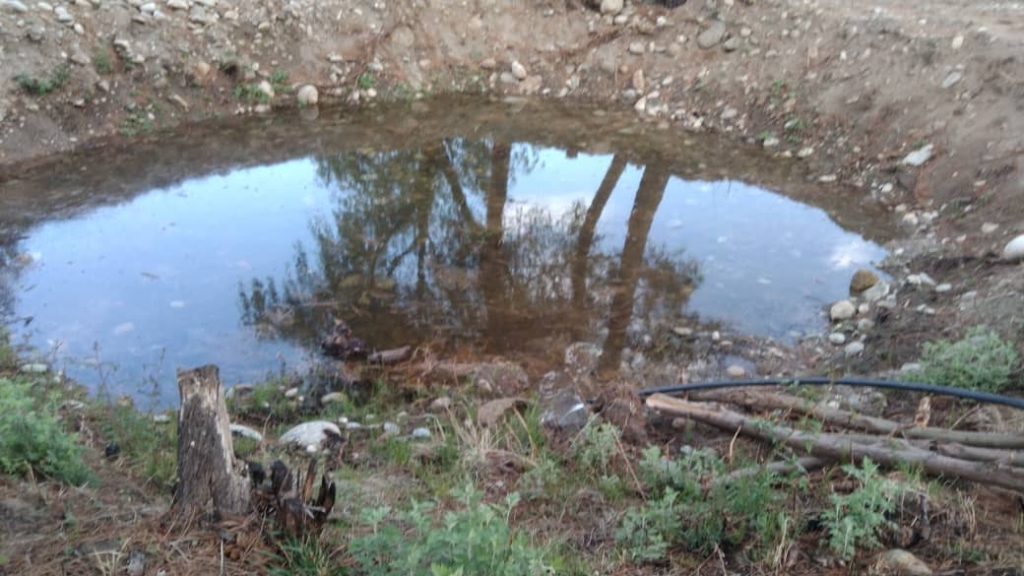
By pursuing these projects, the Soul Farmers are trying to create an eco-community, focused on eco-friendly farming and creating eco-friendly plantations. For their new project, Lhundup and his team specifically rely on two concepts that have been developed in other countries by members of our eco-temple network. One of these concepts is Kok Nong Na, an approach that was promoted by the Thai King Rama IX, and has further been developed and implemented by eco-temple network member Phra Sangkom. The goal of Kok Nong Na is to create a self-sustainable economy, where farmers can live off their mixed harvest, their water sources, and their medical plants, while still being able to sell the surplus for economic gains. Giving the farmers the chance to create their own water reservoirs is a crucial aspect of Kok Nong Na, and Lhundup and his team already created a natural storage pond where they can store around 50’000 liters of water.
Another concept the Soul Farmers are implementing on the site of their floriculture is Metta Gardening. The Metta Garden concept was first developed by eco-temple network member Kanchana Weerakoon in Sri Lanka. It is about creating gardens that are there for all creatures rather than just people. Metta Gardens are designed in the shape of a mandala, with beds, that are organized in circles around a center, representing a ripple effect. Lhundup and his team decided to create their floriculture in said manner and to call it Healing Metta Garden. Implementing the Metta Garden in the Soul Farmers’ context has been an interesting experience according to Lhundup. The design of their garden is the same as the design of previous Metta Gardens, but the one in Bhutan is going to be much larger, than the typical Metta Gardens.
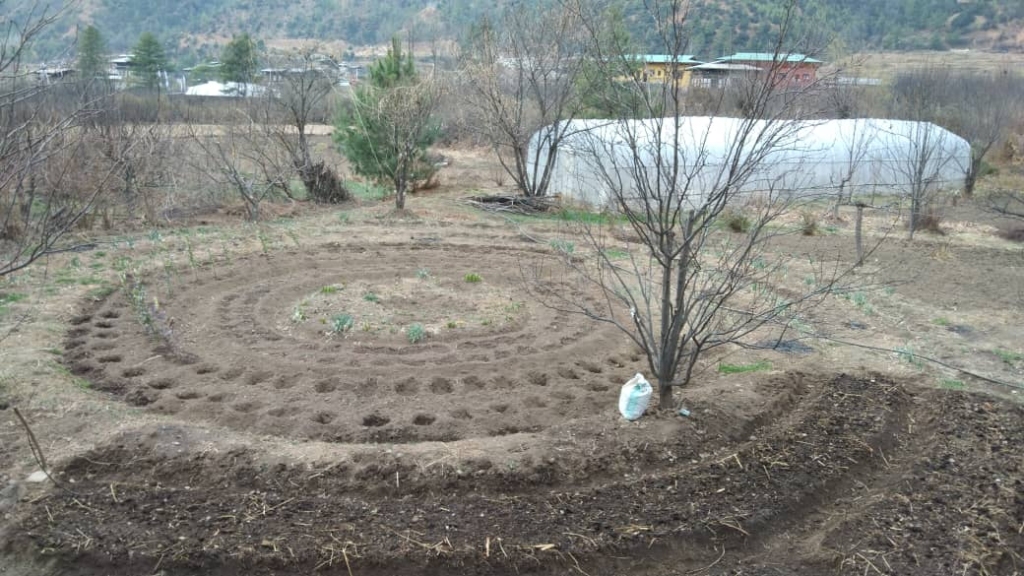
With all the different species growing in their floriculture the Soul Farmers are creating an income-generating system. They grow flowers that can be eaten or made into tea, some find medicinal use, while others are used to create flower bouquets. Just like at the original Metta Gardens, the Healing Metta Garden is a place where people from the community can spend some time to relax. Further, the garden also serves as a research center. Children can come to learn about different plants, and get familiar with their names and purposes while interested farmers can visit to learn more about organic farming and how to grow flowers, vegetables and fruits in sustainable ways. Similarly, to Kanchana’s Metta Garden team in Sri Lanka, the Soul Farmers offer specific hands-on workshops for school students, in which the kids visit the farm, stay overnight and get introduced to organic farming.
A challenge in organic farming is to acquire all the seedlings and develop the mother plants in order to plant more trees and flowers from there. Because simply buying all the saplings and seeds is not a sustainable option. The source is often unknown, and there is a risk of ending up using GMO seeds. Moreover, being an organic farm, the Soul Farmers do not use chemical fertilizer, insecticides, or pesticides. So, the process of acquiring, planting and growing the seeds and saplings has to be planned very carefully.
After establishing their new organic farming project, Lhundup and his team will focus on reaching out to the surrounding community, especially the monastic community in Bhutan. They want to encourage the monasteries to adapt their concepts and to start organic farming projects themselves. Not far from Lhundup’s farm, there is a monastery that owns a lot of land. This land, however, is mostly empty and the monastery doesn’t have a strategy on how to make use of it. Therefore, once the current project is finally up and running, Lhundup is planning to reach out to the monastery to try and help them set up an eco-temple community.
Spreading the knowledge to the communities especially the monasteries is very important to Lhundup. He explains that there are eco-temples in other countries e.g. in Japan and Korea that are more active and also foster international exchange. In Bhutan, many monasteries are not so open, they do not have the facilities to host guests, their temple is only for the monks who live and practice there. By introducing them to the eco-temple concept, Lhundup hopes to make the monasteries more sustainable, self-sufficient, and engaged. They might create a community shelter on the temple grounds or offer rooms for international guests, who are interested in learning about spirituality, and practicing it.
By helping the monasteries develop organic farming schemes, and introducing them to international networks, Lhundup hopes to make them more self-sustainable. Right now, the monasteries rely on contributions and donations from outside. The problem is that this way of generating funds is neither sustainable nor reliable. It is not always clear where exactly the money is coming from. The monasteries might receive money from places that are at odds with their Buddhist values. A monastery might promote values of love and kindness while getting money from a butcher house or a company that is damaging the environment. Lhundup stresses that the monasteries must be able to survive on their own. Because being self-sustainable also means being free and being able to promote Buddhist values while not being compromised. Many smaller monasteries already had to shut down because of lack of funding. Farming in the style of the Soul Farmers could be a real chance for some of the remaining monasteries. Horticultures and floricultures, based on organic farming, and connected to the concepts of Kok Nong Na and Metta Gardening, could allow the monasteries to be more self-reliant and independent, financially but also in the sense of food security, all while connecting to the local and international community.
Besides being in contact with the monastic and the civil communities, the Soul Farmers are also sharing their knowledge on how to farm organically and sustainably with other farmers in the area. Lhundup recalls, that when he moved to the area around fifteen years ago, the vast majority of farmers – mostly apple farmers – were using pesticides on their land. Throughout the past two decades this had a very severe impact on the land. Due to the intense use of pesticides the bees in the area were practically wiped out. However, every time there was a community meeting, Lhundup made sure to raise that point and share his concerns about using pesticides, regarding the environmental harm they cause as well as the health risks they pose. He shared the Soul Farmers’ concepts on organic farming and eventually more and more other farmers were convinced by his arguments. Throughout the last six years most of the neighboring farmers have actually stopped using pesticides on their apple plants. Not relying on pesticides has many concrete advantages for the farmers themselves. The people working in the fields can walk around barefoot, they don’t need rubber boots, gloves, or any other form of protection. The earth and the surrounding environment are healthier and biodiversity increases. And as for the fruits and vegetables, on an organic farm you can just pluck, rinse and then eat them, rather than having to further sanitize them or treat them chemically. When he’s talking to other farmers, it’s important to Lhundup not to impose his views on them, but simply share his observations and his knowledge with them and help them to change their own ways of farming if they are interested in his approach.
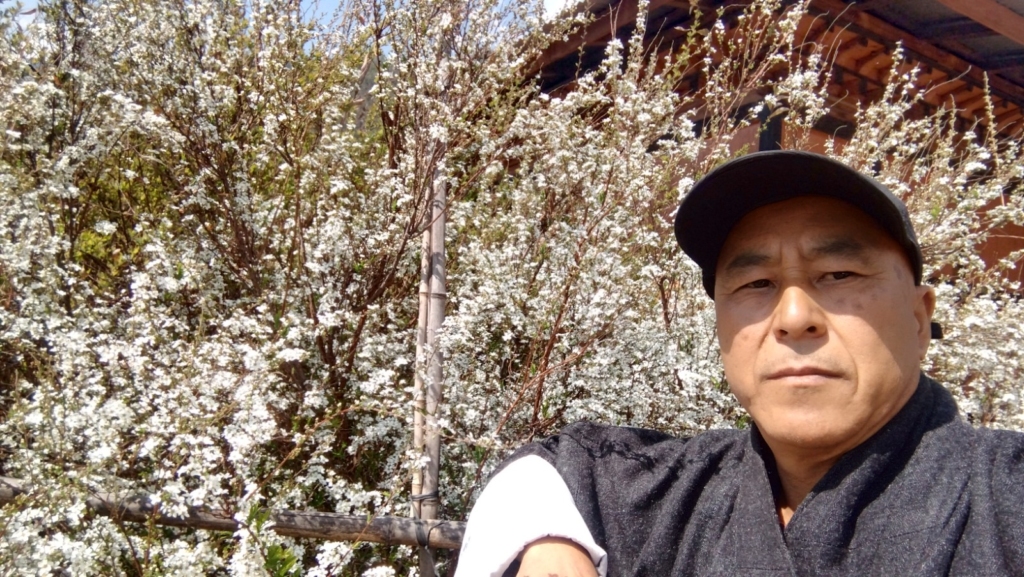
Lhundup elaborates, that in order to be happy, one must consider the happiness of all the beings around them. The earth must be healthy since our happiness depends on its wellbeing. Living in a healthy environment adds to your happiness in many direct and indirect ways. The project, that the Soul Farmers are trying to promote is one that will benefit the whole community and it poses a concrete chance for other farmers as well as the monastic community. For laypeople, it is important to see different agricultural models being implemented in the area they live, and the horticulture and the Healing Metta Garden are important examples. Because despite the progress made so far, there is still a long way to go. Most of the other farmers still grow their products using chemical fertilizer, and for now the Bhutan Soul Farmers are the only ones farming in a strictly organic way.

